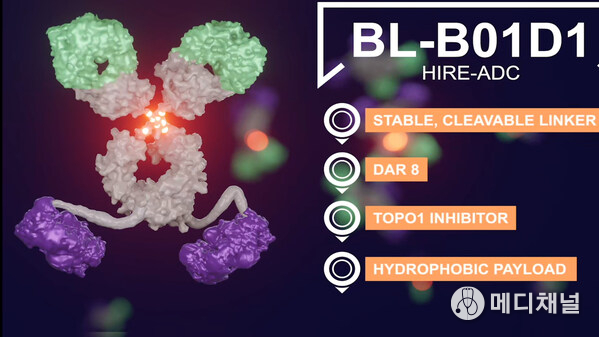BEIJING, Oct. 22, 2025 -- In October 2025, a partnership between Biokin—a rising star in China's innovative pharmaceutical sector—and global pharmaceutical leader BMS triggered a $250 million milestone payment. This is believed to be the largest antibody-drug conjugate (ADC) milestone payment among hundreds of out-licensing deals involving Chinese innovative drugs. Notably, the overall transaction had previously set a record for the total value of a single-drug asset license in China.

In recent years, China's dynamic pharmaceutical ecosystem has rapidly emerged as one of the world's leading sources of novel drug molecules. Such collaborations, however, often come with uncertainties in both China and the U.S. Following the $800 million upfront payment received in early 2024, Biokin's partnership with BMS has advanced smoothly once again. This progress has prompted skeptics to recognize iza-bren's blockbuster potential.
The momentum behind the collaboration stems from the continued validation of iza-bren's efficacy. At the 2025 World Congress on Lung Cancer (WCLC), after Dr. Fang Wenfeng presented domestic clinical data, a physician from the prestigious MD Anderson Cancer Center in the U.S. approached him, expressing hope the drug would launch in the U.S. as soon as possible.
Such a conversation would have been unimaginable in the past. Despite remarkable progress of China's biopharmaceutical industry over the past decade, nearly all first-in-class new drugs still originate from Western countries. While China has accelerated efforts to bring in overseas innovations, it has also strongly supported domestic pharmaceutical companies and clinical systems in pursuing innovation.
Dr. Fang works at the renowned Sun Yat-sen University Cancer Center (SYSUCC), where his team has conducted clinical research on iza-bren for several years. In a study of 50 patients with locally advanced or metastatic EGFR-mutated NSCLC—who had received first-line treatment with other drugs but no chemotherapy—iza-bren controlled tumor progression for over a year, nearly doubling the duration achieved by the current global standard of care.
More positive data about iza-bren emerged at the 2025 European Society for Medical Oncology (ESMO) Congress in mid-October. For the first time, results from the pivotal Phase III registration trial of this global first-in-class EGFR×HER3 bispecific ADC were reported: the drug achieved a twofold improvement in key efficacy endpoints in third-line or above treatment for nasopharyngeal carcinoma (NPC). The full study results were published in The Lancet, a leading international medical journal.
More than 40 clinical studies of iza-bren are currently underway worldwide, including 10 Phase III registration trials in China and 3 key registration studies overseas. Regulators in China and the U.S. have designated some of these studies as "Breakthrough Therapies" to expedite development. The drug is expected to launch first in China in 2026—three years earlier than its planned U.S. launch—marking a milestone moment for China's innovative pharmaceutical sector.
Growing industry consensus on iza-bren's blockbuster potential began at the 2023 ASCO Annual Meeting. At the time, Professor Zhang Li from SYSUCC first reported promising efficacy signals of the drug's Phase I trial.
Iza-bren's unique bispecific ADC technology and its ability to target two high-value antigens (EGFR and HER3) have endowed it with strong efficacy and broad applicability. This has attracted multinational pharma giants facing looming patent cliffs and eager to expand their ADC portfolios. BMS reached a global co-development and commercialization agreement with Biokin, the developer of iza-bren, at a potential total value of up to $8.4 billion.
Biokin distinguishes itself among China's biotech companies with its unconventional approach. It transitioned from a generic drug manufacturer, and its founder, Zhu Yi, holds no medical degrees from Europe or the U.S., nor has he worked at multinational pharmaceutical companies. Over a decade ago—when the Chinese government first began mapping out the blueprint for its innovative drug ecosystem—Zhu made a firm decision to go all-in on innovative drug R&D. In 2014, amid a global downturn in drug development, he established a lean scientific team in Seattle, U.S., marking the start of his drug R&D journey. Zhu fully leveraged the strengths of both the Chinese and U.S. biopharmaceutical ecosystems: in the U.S., he accessed resources that support early-stage innovation; in China, the efficient regulatory system, large pool of engineers, and abundant patient resources enabled the rapid translation of innovative ideas into reality.
Zhu negotiated distinctive terms with BMS: beyond the substantial financial offer, he secured overseas R&D and commercialization rights. He firmly believes the latter is essential for Biokin to truly join the ranks of global pharmaceutical companies. The establishment and progress of this ambitious collaboration model have empowered Biokin to send a strong message for China's biotech industry: to become a multinational company within five years.
Beyond iza-bren, Biokin also announced clinical trial results for T-bren, its second ADC drug in Phase III, at the ESMO Congress. Targeting common cancers such as lung, gastric, and breast cancer, T-bren also showed strong signals of becoming a best-in-class drug. Additionally, China's CDE recently approved Biokin's first antibody-radionuclide conjugate (ARC) drug to enter clinical trials.
Biokin's story has captured the market's attention. On China's mainland stock exchanges, its market value has surged 15-fold in just over two years. Now, Hong Kong's capital market is embracing the company. Amid the hesitation of onlookers, Biokin may well emerge as a global leader in biopharmaceuticals.

